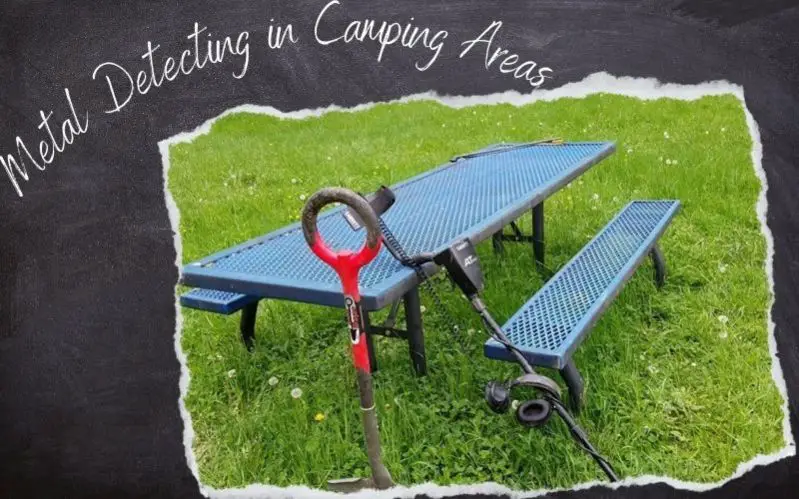
Camping areas are one of the best places for gathering travelers & outdoor enthusiasts. This definitely makes it a prime location for metal detecting …
In this article, I explore with you the different types of treasures you might discover in these sites as well as the right approach and strategies you should opt for to ethically maximize your finds.
If this sounds good enough for you, then pack your tent & beloved metal detector to prepare for your next adventure that will combine both the joys of camping and metal detecting.
Key Takeaways
- High traffic camping areas are usually the most fruitful for metal detecting. However, it is still important to use the right equipment and metal detector settings to make the most out of your hunts.
- Securing the necessary permission, following the rules and respecting the environment are a Must!
- It is very important to use the proper gear that prioritize your safety and help you minimize your searching time (these include knee pads, sturdy digger, pinpointer …)
Why should you consider Metal Detecting in Camping Areas?
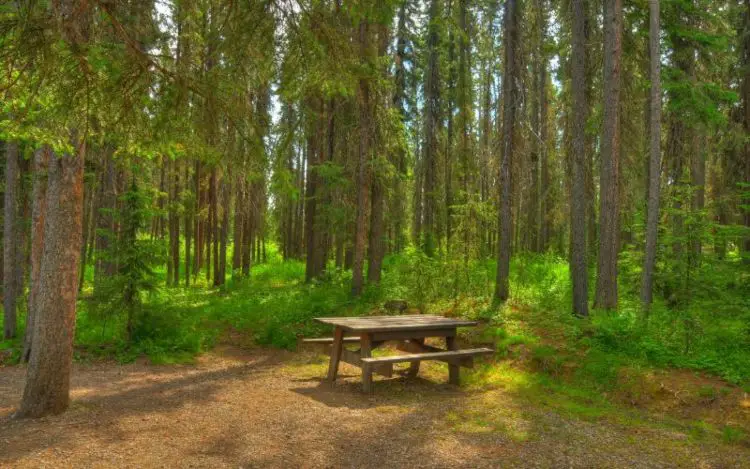
There are some people who don’t really believe in the potential of searching camping sites. Below are couple of reasons that might change your mind:
- Historic Artifacts: There are some campgrounds that have a rich history where people have camped for so many decades. This can lead to fascinating finds like old coins or relics.
- Lost Items: It is commonly known that campers frequently lose items. This would increase your chances of discovering things like jewelry, watches, or other valuable items. (Ethically, you should return these finds to their owner)
- Varied Terrain: Most detectorists typically detect in the same places (fields & beaches). Detecting on campgrounds, is a great opportunity to change that and have a varied detecting experience.
- Recreational Fun: Metal detecting in camping areas is a nice way to enjoy the outdoors and add a sense of adventure and excitement to your camping experience, while (why not) potentially finding treasures!
Types of camping areas and potential finds …
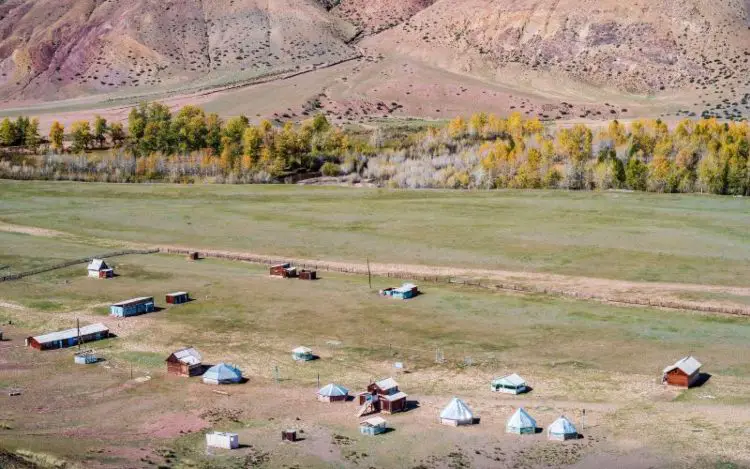
There are different types of camping areas that you should learn about, based of which you should decide the right one for you:
- Forest Campgrounds: These are usually Rich in history … They can yield finds like antique relics, coins, and hunting gear.
- Beach Campsites: This is a sweet option for beach lovers like me. Beach campsites are known for lost jewelry and coins due to high foot traffic. It is not uncommon to find sea-related artifacts.
- Mountain Camping: These places are usually close to mine sites that might hold lost equipment or even nuggets in gold-rich regions (you can learn about using your metal detector in mountains)
- RV Parks: These places are usually trashy in iron junk. You need to properly set proper machine discrimination. However, you can easily find a plethora of lost personal items, like watches or jewelry.
- Historic Campsites: These places require a permit to use a detector there. Make sure you can the necessary permit/permission to avoid being into unnecessary trouble … Historic campsites hold a vintage of items and relics from previous generations, offering a glimpse into the past (You can learn how to search historical sites)
Quick Metal Detector recommendation for camping areas …
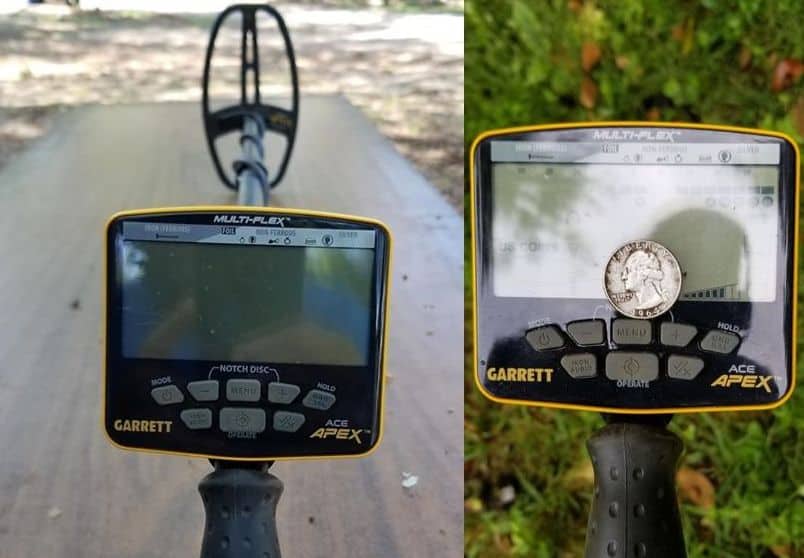
The Garrett ACE Apex (Check it Here at Amazon) is almost a perfect choice for metal detecting in campsites due to its multi-frequency technology …
This capability allows it to perform in any ground condition for diverse campsite terrains. It has a lightweight design that will help you to easily carry it around even for extended detecting sessions.
Also, it comes with an excellent iron discrimination which is perfect to ignore iron junk which is not uncommon in camping areas.
In case you are dealing with an unexpected weather or wet conditions, then the Apex will be very helpful in that matter as it comes with a waterproof coil that can easily handle that.
How to research and select the best camping sites for metal detecting?
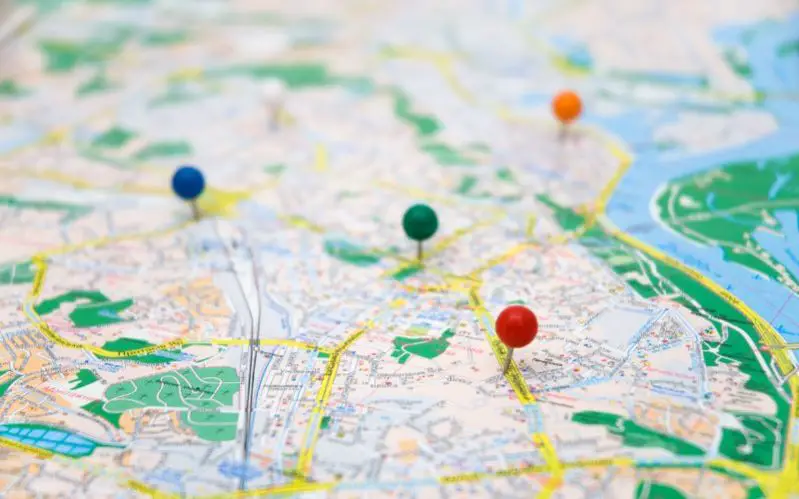
To properly research and select the best camping sites for metal detecting you need a combination of:
- Online research.
- Historical understanding.
- Local knowledge
- In addition to some practical considerations …
If you are a beginner, start with a quick online search of popular camping areas in your target region. Focus on sites that have been in use for quite a long time, preferably located near historical landmarks.
Resources like historical maps could also be very helpful in that regard. They can point you directly to such areas.
Local metal detecting clubs and related forums (preferably facebook groups) can help you find a lot of similar locations …
The goal at the beginning is to have an initial list of potential places!
Once this first step is done, you need to carefully check the legality & regulations when it comes to metal detecting in those areas. Metal detecting is prohibited altogether is some camping sites, while it is allowed in others with some sorts of restrictions …
My recommendation here is to have a sort of Excel table that looks somewhat like this:
| Location | Exact address & or position | Camping area category | Close to historical site (yes/no) | Prohibited (Yes/No/With Restrictions) | Restriction details |
| Location 1 | |||||
| Location 2 | |||||
| Location 3 |
This table is a very simplified way to help you categorize and rate your camping locations as a potential target for metal detecting. You can do a much better Job than that!
Try to consider the physical characteristics of the campsite. By asking these kinds of questions:
- Are there areas where people might lose items like swimming areas, trails or activity centers?
- Is the area very accessible?
- What is the terrain actually like?
- …
Don’t forget to do a preliminary visit without metal detecting. Just try to access the area and check the ground and try to make a detection plan.
You can do some digging to understand the ground type & nature, yet always remember to leave no trace or damage.
Techniques for detecting at camping areas
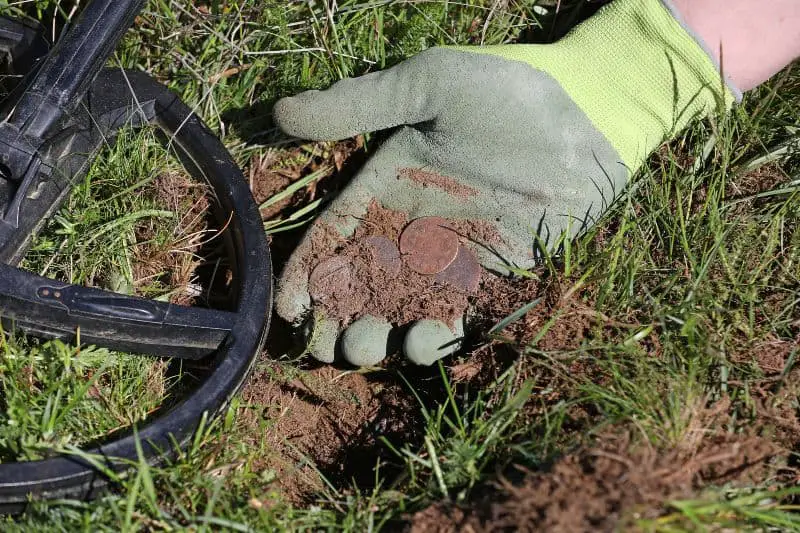
Below are couple of tips & techniques that you should consider to make the most out of your metal detection efforts in those camping areas:
- Detect around high-traffic areas: Places like picnic spots, swimming areas, trails often yield the best possible finds.
- Use appropriate coil size: If you are a beginner, you need to be educated about that. Overall, a smaller coil can navigate cluttered areas with ease, while a larger coil might be suited for more open spaces. I highly invite you to check this guide on how to select the right metal detector coil size.
- Adjust settings: This mainly depends on the ground conditions. The most important settings you should keep adjusting until you find the right combination are sensitivity and ground balance.
- Pinpoint and dig carefully: That’s really important to avoid causing any sort of damage to finds and to preserve the environment.
- Early or late detection: This is one of the best advices I can give you … Always, try to detect early in the morning or late in the evening when campsites are less crowded.
- Respect regulations and etiquette: Always get permission, follow the rules and fill in any holes you dig. Prioritize returning lost things to their original owner.
Legal and ethical considerations when detecting in camping areas
Metal detecting in camping areas is an exciting pursuit, but it is crucial to adhere some legal guidelines and ethical norms …
- Firstly, always seek permission: Again, some camping areas, especially those on private or protected lands, may have specific and/or restricting rules about metal detecting. There are some cases where you might need to obtain a permit.
- Respect the rights of other campers: I don’t recommend detecting in crowded areas or causing disturbances to people who are enjoying their time. Detecting early in the morning or late at night is a great solution.
- Dig responsibly to minimize damage to the environment: I recommend checking this guide to properly dig for metal detecting.
- Never remove any historical or archaeological artifacts: This is not only unethical but also illegal.
- Always remove and dispose of any trash you encounter: This won’t only help clean the environment but also make your detecting efforts much easier. Never forget: A responsible detectorist means leaving the area better than you found it.
Safety and equipment tips for detecting while camping
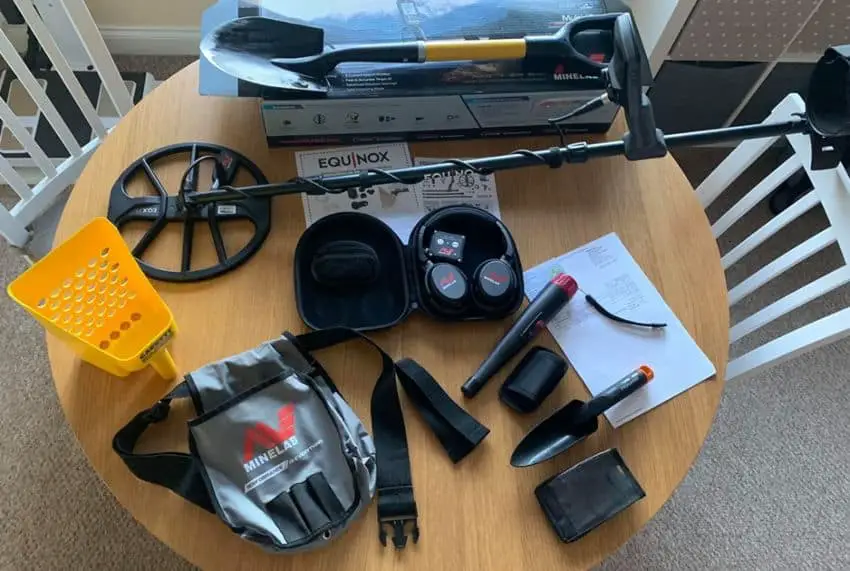
I can’t emphasize enough the importance of prioritizing your own safety. Below are couple of tips:
- Prepare the essentials: Using a sturdy digger, a pinpointing device and a finds pouch are very important as well as extra batteries for your detector in case your batteries run out of charge.
- Protect yourself: It is very recommended to use waterproof boots to protect your beloved feet from rough terrain or unexpected water. Gloves are also necessary to protect your hands while digging or handling sharp objects. You also need to protect yourself from sunlight and UV rays by using a hat and applying sunscreen.
- Stay hydrated: Bring plenty of water. The last thing you would want to face is being thirsty or dehydrated during a long detecting session.
- Communication is key: Make sure you bring a charged cell phone or radio for emergencies. Let, at least, someone know where you’ll be detecting and when you plan to return.
- First Aid Kit: Many people take this for granted, but believe me, you never know what might happen. Always bring a basic first aid kit in case of need.
Final Thoughts …
Hopefully, this article has made it clear for you that camping areas can be a goldmine for metal detecting, offering opportunities to find valuable and even historical items …
If you follow the tips & techniques I’ve shared in this article, you will do just fine. But again, please don’t forget to be respectful to the environment and to the people and avoid disturbing them.
Finally, if you are interested in hiking, then have a look at this guide to have fun metal detecting and hiking at the same time!
